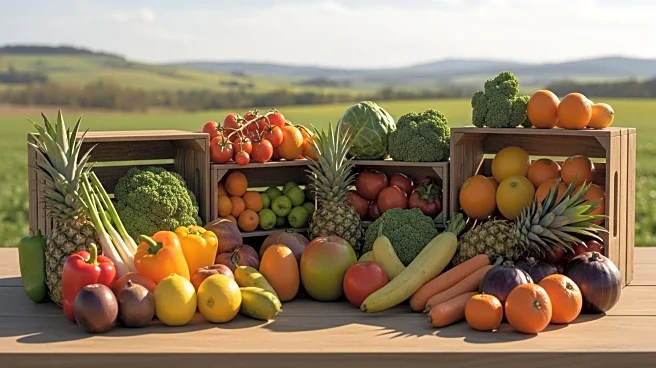What is the story about?
What's Happening?
The South African agricultural sector is focusing on enhancing its competitiveness in the export market, as discussed at a G20-related session in Cape Town. Theo Boshoff, executive head of Agbiz, emphasized that while market access is crucial, it is merely the first step towards success. The sector faces challenges such as high transportation costs and non-tariff trade barriers. Despite the African Free Trade Agreement, infrastructure and logistics issues persist. The local soybean industry, although successful, finds it cheaper to import soy from Argentina than to transport it domestically. The wine industry also faces unique challenges due to its alcohol content, requiring engagement with multiple government departments. The citrus industry, a success story, aims to increase exports but faces high tariffs in markets like India and South Korea.
Why It's Important?
The focus on competitiveness in South Africa's agricultural exports is significant for the U.S. as it impacts global trade dynamics and market access. The U.S. is a major consumer of South African wine and citrus, and changes in tariffs or market access could affect American retailers and consumers. The agricultural sector's push for improved infrastructure and reduced tariffs could lead to more competitive pricing and increased availability of South African products in the U.S. market. Additionally, the emphasis on health and premium markets aligns with U.S. consumer trends towards healthier and premium products.
What's Next?
South Africa's agricultural sector is likely to continue advocating for reduced tariffs and improved infrastructure to enhance competitiveness. The citrus industry aims to expand its market share in Asia, particularly in China, where tariffs are expected to decrease. The wine industry will continue to navigate regulatory challenges and seek sustainable market presence. These efforts may lead to increased trade negotiations and potential policy changes affecting U.S.-South Africa trade relations.
Beyond the Headlines
The challenges faced by South Africa's agricultural sector highlight broader issues of global trade inequalities and the impact of tariffs on developing economies. The emphasis on competitiveness over mere market access underscores the need for sustainable trade practices. The wine industry's regulatory challenges reflect the complex interplay between trade, health, and social policies. These dynamics could influence future trade agreements and international relations, particularly with major trading partners like the U.S.















